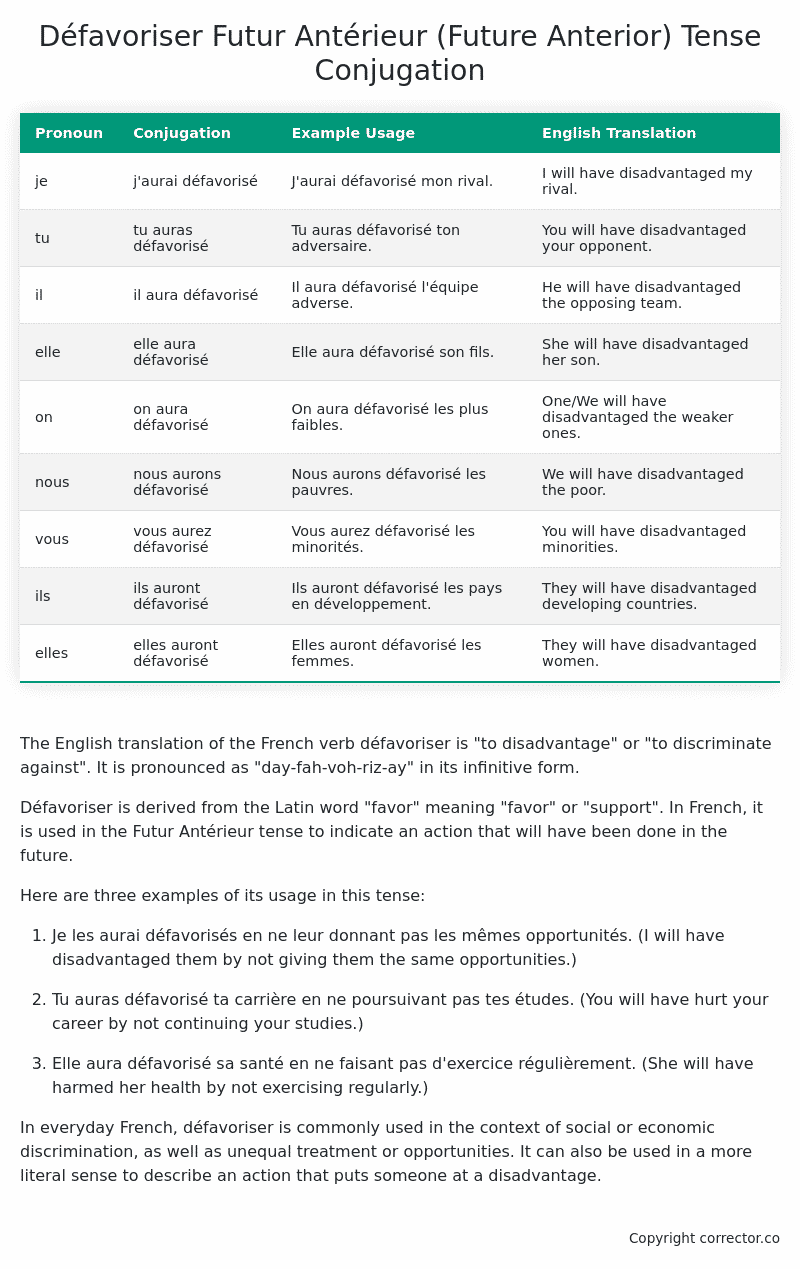Futur Antérieur (Future Anterior) Tense Conjugation of the French Verb défavoriser
Introduction to the verb défavoriser
The English translation of the French verb défavoriser is “to disadvantage” or “to discriminate against”. It is pronounced as “day-fah-voh-riz-ay” in its infinitive form.
Défavoriser is derived from the Latin word “favor” meaning “favor” or “support”. In French, it is used in the Futur Antérieur tense to indicate an action that will have been done in the future.
Here are three examples of its usage in this tense:
-
Je les aurai défavorisés en ne leur donnant pas les mêmes opportunités. (I will have disadvantaged them by not giving them the same opportunities.)
-
Tu auras défavorisé ta carrière en ne poursuivant pas tes études. (You will have hurt your career by not continuing your studies.)
-
Elle aura défavorisé sa santé en ne faisant pas d’exercice régulièrement. (She will have harmed her health by not exercising regularly.)
In everyday French, défavoriser is commonly used in the context of social or economic discrimination, as well as unequal treatment or opportunities. It can also be used in a more literal sense to describe an action that puts someone at a disadvantage.
Table of the Futur Antérieur (Future Anterior) Tense Conjugation of défavoriser
| Pronoun | Conjugation | Example Usage | English Translation |
|---|---|---|---|
| je | j’aurai défavorisé | J’aurai défavorisé mon rival. | I will have disadvantaged my rival. |
| tu | tu auras défavorisé | Tu auras défavorisé ton adversaire. | You will have disadvantaged your opponent. |
| il | il aura défavorisé | Il aura défavorisé l’équipe adverse. | He will have disadvantaged the opposing team. |
| elle | elle aura défavorisé | Elle aura défavorisé son fils. | She will have disadvantaged her son. |
| on | on aura défavorisé | On aura défavorisé les plus faibles. | One/We will have disadvantaged the weaker ones. |
| nous | nous aurons défavorisé | Nous aurons défavorisé les pauvres. | We will have disadvantaged the poor. |
| vous | vous aurez défavorisé | Vous aurez défavorisé les minorités. | You will have disadvantaged minorities. |
| ils | ils auront défavorisé | Ils auront défavorisé les pays en développement. | They will have disadvantaged developing countries. |
| elles | elles auront défavorisé | Elles auront défavorisé les femmes. | They will have disadvantaged women. |
Other Conjugations for Défavoriser.
Le Present (Present Tense) Conjugation of the French Verb défavoriser
Imparfait (Imperfect) Tense Conjugation of the French Verb défavoriser
Passé Simple (Simple Past) Tense Conjugation of the French Verb défavoriser
Passé Composé (Present Perfect) Tense Conjugation of the French Verb défavoriser
Futur Simple (Simple Future) Tense Conjugation of the French Verb défavoriser
Futur Proche (Near Future) Tense Conjugation of the French Verb défavoriser
Plus-que-parfait (Pluperfect) Tense Conjugation of the French Verb défavoriser
Passé Antérieur (Past Anterior) Tense Conjugation of the French Verb défavoriser
Futur Antérieur (Future Anterior) Tense Conjugation of the French Verb défavoriser (this article)
Subjonctif Présent (Subjunctive Present) Tense Conjugation of the French Verb défavoriser
Subjonctif Passé (Subjunctive Past) Tense Conjugation of the French Verb défavoriser
Subjonctif Imparfait (Subjunctive Imperfect) Tense Conjugation of the French Verb défavoriser
Conditionnel Présent (Conditional Present) Tense Conjugation of the French Verb défavoriser
Conditionnel Passé (Conditional Past) Tense Conjugation of the French Verb défavoriser
L’impératif Présent (Imperative Present) Tense Conjugation of the French Verb défavoriser
L’infinitif Présent (Infinitive Present) Tense Conjugation of the French Verb défavoriser
Struggling with French verbs or the language in general? Why not use our free French Grammar Checker – no registration required!
Get a FREE Download Study Sheet of this Conjugation 🔥
Simply right click the image below, click “save image” and get your free reference for the défavoriser Futur Antérieur tense conjugation!

Défavoriser – About the French Futur Antérieur (Future Anterior) Tense
Construction
Common Everyday Usage Patterns
Interactions with Other Tenses
For example
Summary
I hope you enjoyed this article on the verb défavoriser. Still in a learning mood? Check out another TOTALLY random French verb conjugation!


